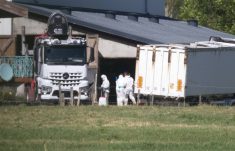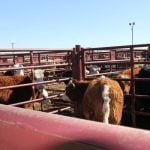The British Columbia cheese farm recalling a list of various raw-milk cheeses in the wake of an E. coli outbreak is now under provincial order to sell no cheese at all.
Gort’s Gouda Cheese Farm of Salmon Arm, B.C. on Tuesday became the subject of a health hazard alert and a recall monitored by the Canadian Food Inspection Agency.
The recall involves 15 Gort’s products — the 14 announced Tuesday plus, as of Thursday, Gort’s Mild Gouda, which was sold at certain B.C. retailers and via the internet between May 27 and Sept. 14.
Read Also

U.S. livestock: Cattle fall sharply as Trump says he’s working to lower beef costs
Chicago cattle futures fell sharply on Friday after U.S. President Donald Trump said his administration was working to lower the…
The Public Health Agency of Canada is now investigating 13 cases of illness from E. coli O157:H7 for which it’s identified cheese from the Gort’s plant as “the source of the illness.”
Those cases include one death and three other illnesses in B.C.; eight illnesses in Alberta; and, as of Friday, one case in Saskatchewan. Apart from the person who died in B.C., the others made ill “have recovered or are recovering,” PHAC said Friday.
“Concern and sorrow”
On top of the recall, Gort’s announced on its website it has now been prohibited by the B.C. Centre for Disease Control from selling or supplying any cheese produced or processed at the Salmon Arm plant.
The BCCDC order includes Gort’s pasteurized-milk cheeses and import cheeses as well as its unpasteurized (raw) milk cheeses, the company said. “We are doing what we can to have the BCCDC narrow this prohibition.”
The company noted it’s still authorized to sell and supply pasteurized dairy products other than cheese, such as its fluid milk, yogurt, fluid cream and quark (cream cheese).
Gort’s announcement emphasized the company’s “concern and sorrow for those who may have been affected” in this outbreak.
“We apologize to our loyal customers for the recall of our raw milk cheeses and to all who may have suffered by eating our cheese,” the company said, noting it’s “co-operating fully” with the PHAC and CFIA investigations and will not comment further “until final results of the investigation are released to us.”
According to CFIA, the Salmon Arm facility’s last inspection was completed Aug. 28 and found to be “in compliance with all federal requirements.” An “in-depth” CFIA inspection at the facility was in April 2013 and “no major concerns were identified,” the agency said.
CBC reported Thursday that one of the health inspectors sent to the Gort’s farm is the daughter of the farm’s original owners and a former manager at the farm. The Gort family ran the Salmon Arm farm from 1983 until 2007, when ownership switched to the Wikkerink family of Agassiz.
According to CFIA, the last non-compliance for cheese from the Gort’s plant was in 2009, relating to “non-satisfactory CFIA sampling for Staphylococcus aureus and E. coli.” Product associated with that sample was recalled.
CFIA had also issued a Class III recall for Gort’s heavy cream in 2012 when “a batch of heavy cream did not reach the required temperature for pasteurization.”
Generally safe
While unpasteurized (“raw”) milk by itself is prohibited from commercial sale in Canada, sales of cheese made from raw milk are allowed, CFIA said. Such cheeses, the agency said, are “manufactured and produced in a way that helps eliminate harmful bacteria that may be present” in the milk.
Specifically, raw-milk cheeses sold in Canada are subject to Health Canada requirements that they first be stored for 60 days at temperatures of 2 C or above. According to a video on the Gort’s website, the company stores mild cheeses for two months, medium cheeses for four months and aged cheeses for 12 to 24 months.
It’s “generally considered safe” to eat raw-milk cheese, CFIA said, but noted it can cause “serious health effects” for children, older adults, pregnant women and people with weakened immune systems.
People in those risk groups should avoid eating raw-milk cheeses — especially soft and semi-soft varieties such as Brie, Camembert or blue-veined cheeses, CFIA said. They should eat pasteurized-milk cheeses instead, and make sure the cheese is a pasteurized product either by reading the label or asking the seller.
Most strains of E. coli are harmless, PHAC notes, but some such as O157:H7 can cause severe stomach cramps, diarrhea and vomiting. Symptoms usually last five to 10 days.
About five to 10 per cent of those who get sick from O157:H7 develop hemolytic uremic syndrome (HUS), an acute renal failure which can be fatal. Among those who get sick, children younger than five years old and the elderly are at greatest risk of developing HUS.
Food-borne cases of O157:H7 are “not unexpected” in Canada and no unusual increases in the number of these illnesses have been detected nationally, PHAC said Friday. More generally, the agency’s National Enteric Surveillance Program shows E.coli cases in Canada have been “declining in recent years.” — AGCanada.com Network














